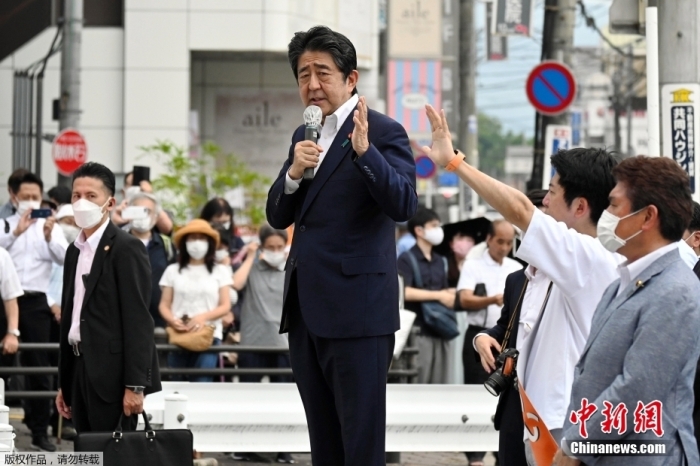China News Service, July 16. Comprehensive foreign media reported on the 16th that the Japanese government has basically finalized that it will hold a state funeral for Abe this fall, and the cost plan will be fully borne by the state.
Japanese public opinion is divided on this. Several opposition parties issued their own statements on the 15th, expressing their opposition to holding a state funeral.
On July 8, local time, former Japanese Prime Minister Abe was shot during a speech in Nara City.
Japanese media said the suspect has been taken into custody by the police.
The picture shows former Japanese Prime Minister Shinzo Abe giving a street speech before being shot.
Image source: Visual China
Japanese government wants to hold state funeral for Abe
Demonstrated "determination not to succumb to violence"
According to Kyodo News, at noon on the 11th, the day after the votes were counted in the Japanese Senate election, at a party high-level meeting held at the headquarters of the Liberal Democratic Party, several people proposed to hold a state funeral.
Prime Minister Fumio Kishida has since discussed the possibility of a state funeral.
On the 13th, Kishida had a dinner with Chief Cabinet Secretary Hiroichi Matsuno, Vice President of the Liberal Democratic Party Taro Aso, and Secretary Toshiyoshi Motegi, and confirmed the direction of the state funeral during the banquet.
Afterwards, the top officials of the Liberal Democratic Party called to inform Abe's wife, Akie, and obtained consent.
As the reason for the implementation of the state funeral, Kishida cited "political achievements" such as reconstruction and economic revival after the Great East Japan Earthquake, and said that by holding a state funeral, Japan's "determination not to succumb to violence" was shown.
The Liberal Democratic Party unanimously welcomed it.
According to reports, the funeral form of the former prime minister of Japan has so far followed the "joint funeral of the cabinet and the Liberal Democratic Party" in principle.
The Japanese government shared about 77 million yen for the joint funeral of Hashimoto Ryutaro in 2006; for the joint funeral of Sone Yasuhiro in mid-2020, the government shared about 96 million yen.
According to Japan's Asahi TV, on the afternoon of July 9, local time, a hearse carrying the body of former Japanese Prime Minister Shinzo Abe arrived at his residence in Tokyo.
Japanese public opinion is divided
"Hope to use this money to support national life"
In this regard, Japan's opposition party Linghe Shinsengumi, the Social Democratic Party and the Communist Party each issued a statement on the 15th, opposing the holding of a state funeral for Abe.
Ling and Xinxuan Group listed the reasons for their opposition in the statement, including that the legal basis for the state funeral does not exist, and that economic revival cannot be said to be achieved.
The Social Democratic Party criticized the Abe government's "Morori and Kake Gakuen issues" and the cherry blossom viewing party's suspicions have not been cleared up.
Some Japanese people also seem to have dissent.
Some netizens posted on social media that under the new crown epidemic and high prices, "I hope to use this money to support national life."

